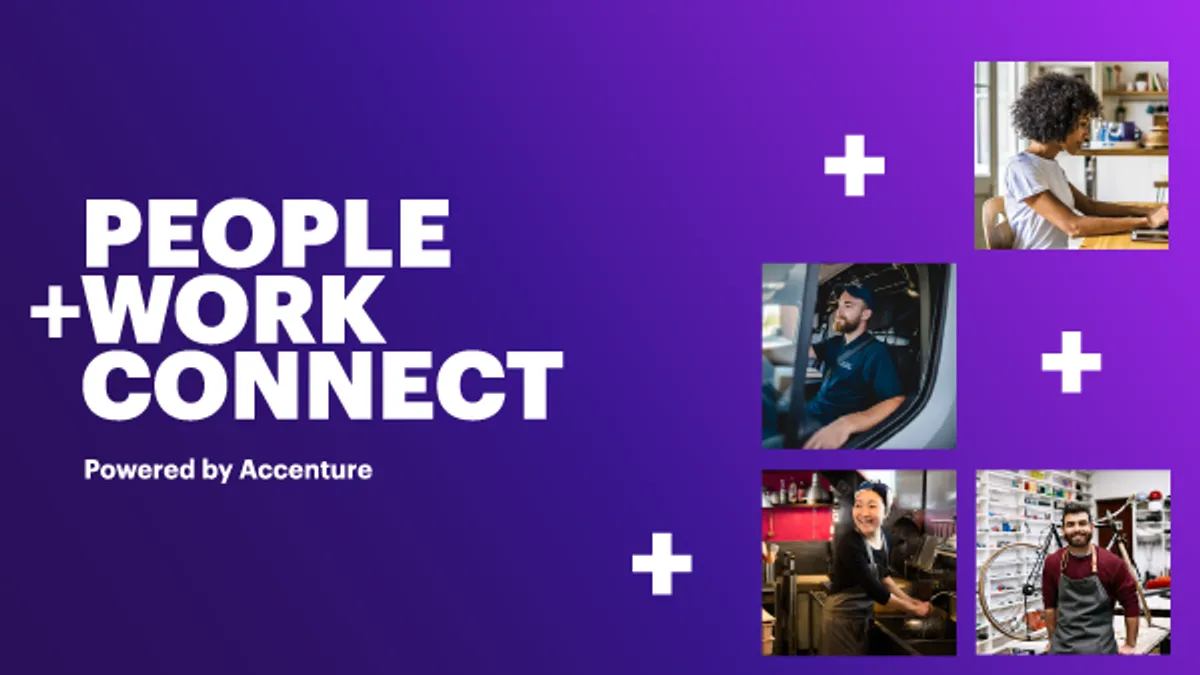As a result of the COVID-19 pandemic, many employers cut jobs while others, particularly those in essential industries, needed more workers. Members of the grocery industry, for example, partnered with movie theatres, hotels, restaurants and others to find talent in a pinch.
As unemployment peaked and local lockdowns spread, a group of four HR executives banded together to address worker displacement, directly connecting employers conducting furloughs and layoffs with those seeking talent. Their platform, People + Work Connect, launched in just 14 business days with 10 companies signed on. By the end of October, the platform boasted more than 1,500 organizations and spanned 95 countries.
The platform was not designed to track job placements, a spokesperson told HR Dive, but HR executives have spoken about their use of the platform. In a September LinkedIn Live event, Nordstrom Executive Vice President and CHRO Christine Deputy said People+Work Connect "gave us the ability as CHROs to help beyond the barriers of just my employment." John Seward, recruiting manager, delivery at Nestle, said the platform helped the company identify regions, industries and organizations that had available talent at a time when Nestle needed to ensure its supply chains were prepared to meet consumer demand.
Through their teamwork and rapid execution in tackling an urgent, industry-wide problem, People + Work's four co-founders — Ellyn Shook, chief leadership and HR officer at Accenture; Lisa Buckingham, executive vice president and chief people, place and brand officer at Lincoln Financial Group; Christy Pambianchi, executive vice president and CHRO at Verizon; and Pat Wadors, then-chief talent officer at ServiceNow — demonstrated HR leadership in a time of once-in-a-generation crisis.
How People + Work Connect was built
The idea behind People + Work was conceived following a March 24 phone call between multiple CHROs, mainly to discuss how their organizations planned to transition to remote work while keeping employees safe and connected. But news of massive unemployment figures left participants "emotionally distraught," according to Shook.

"It was then that we realized this crisis was much larger than just dealing with the issues in our own organizations," she said. "Not only was there an opportunity to make an impact, but more importantly an obligation to step up to the plate and to use our platform as CHROs to really push through boundaries and bring down barriers in the midst of this health, economic and social crisis."
The four co-founders assembled that same evening. Working with a number of business partners, ranging from technologists and designers to marketers and HR specialists, they launched the platform in April, the same month during which unemployment in the U.S. reached a peak of 14.7%.
Balance was a concern early on, according to Shook, because the group worried it would only attract companies that had conducted furloughs or layoffs and not those that were in need of talent. "What we have seen, however, is that it's been quite even — we now have over 400,000 roles open and people available combined on the platform," she said. Employers on the platform typically search for talent within their own industries, but some of the best matches are being made between employers across industries, Shook noted.

Though shortening the cycle of unemployment is part of the initiative's goals, People + Work's leadership believe they are building something much bigger. Since the launch, the platform has grown to include additional components, including a knowledge exchange, ambassador program and CHRO mentorship program. "We are creating a digital home base for HR leaders to come together, learn from each other and get people back to work," Pambianchi said. "Our constellation of resources will include lessons learned from past CHROs to develop a masterclass series on key topics to help HR teams navigate the unknown and rewrite their playbook."
'This is just the start of a new chapter'

Pat Wadors, former Chief Talent Officer at ServiceNow; now Chief People Officer at Procore
Photo courtesy of Procore
Despite the massive change COVID-19 brought to workers and HR, People + Work's leaders see cause for optimism. The growth of remote work is one example, as it could lead organizations to better prioritize flexibility, worker health and a more human-centric view of the workplace, said Wadors, who is now chief people officer at Procore.
"This is just the start of a new chapter of deeper connections between companies, driven by HR, to better all of our collective workforces," Buckingham said. "We are all sharing more and learning from one another. We aren't competing against one another, we are building vibrant and very different work environments and can help each other and our employees."

CHROs can also break down barriers both within and outside of their companies to create a more equitable future, Shook said; "Our hope is that by bringing down these barriers and taking out the friction, we can actually see the extinguishing of some of this inequality that clearly exists in the job market."
Correction: An earlier version of this story misspelled Procore. HR Dive regrets the error.




 Read more
Read more









